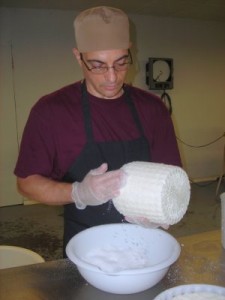Sapori d’Italia makes proletarian food for artisan crowd
By Evan Barker
Making proletarian food would seem like an odd move for a former financial advisor, but Jason Gresham isn’t complaining. Along with his wife Annarita and brother-in-law Giovanni Capezzuto, Gresham, 37, is hard at work building Sapori d’Italia, an “old world artisan Italian market” which sells handmade goat cheese at the Lexington Farmers’ Market and elsewhere.
Sapori d’Italia is most famous for its cheesemaking, headed by Giovanni, or Gianni (pronounced “Johnny”) – a Farmers’ Market mainstay. Gianni’s table is generally located at the center of a crowd of shoppers under the glass at Cheapside plaza. There, he samples five or six varieties of his handmade goat cheese and educates passers-by about his products. Gianni is deadly serious about his cheese. He’s gotten lots of media exposure for his “Italian chèvre” – which name is actually a misnomer.
The cheese – of Gianni’s own invention – is actually called agri and it’s a huge draw at the market. (As it turns out, “chèvre” is the French word for “goat” – no self-respecting Italian would call his cheese chèvre). Gianni wants to show the world that Italians make goat cheese, too, and when he makes it, he makes it by hand, using techniques from his native Italy. His agri is made and aged for 72 hours prior to market with fresh goat milk he pasteurizes himself. It has a consistency like whipped cream cheese.
Gianni’s staple cheese is called caciotta. It’s a firmer, drier cheese with a rind, also made from goat milk and usually mixed with another ingredient – red pepper, herbs, walnuts, cracked pepper – for flavoring.
From whence he came
Of course, Gianni didn’t spring from the bricks of Cheapside fully-formed with his cheese. He has a long and interesting backstory.
Back in Naples, his family owns a few cafes. In the U.S., he’s worked at the Bellagio Hotel and Casino in Las Vegas and at Bella Notte here in Lexington, where he “took the menu native.” After burning out on the restaurant business, he went and worked at UK dining for a change of atmosphere, where he became a student favorite. Jason calls him the “Rain Man of food” due to his apparent ability to turn nearly anything into a stellar meal.
About two and a half years ago, when Gianni and Jason decided to go into business, they tested a few different products. Gianni also makes artisan sausages in addition to cheese, but decided to roll out the cheese first. Now, Sapori d’Italia has a production facility in Nicholasville, a handful of employees, and retail space in the swanky Romany Rd neighborhood.
Retail ambitions and teaching “pauper food”
The Sapori Market is slated to open in early September at 327 Romany Rd. The building has space for deli meat counters, an oven, and a kitchen classroom in the back. There’s a sizeable alcove for wine, and the basement can be remodeled if Gianni needs more space to age his cheese. (Gianni’s cheese ages in the open air on wooden racks. Old-school aging.)
Gianni and Jason are always looking ahead. When the market opens in early September, they’ll offer cooking classes and expand their offerings into the other delicacies Gianni makes, such as sausage and pasta. Annarita, Gianni’s sister and Jason’s wife, is a pastry sorceress.
Jason grins as he lays out the future plans. They’ve just imported five new brands of authentic Italian olive oil –brands with no current distribution in the United States.
Their classes will feature “poor people food” because “with real Italian food, it doesn’t take 20 ingredients to make a pasta dish.” Referring to the ills of American food, Jason touches on real concerns for lower-class consumers. Italian food, at its best, he says, is “pauper food,” and people should be able to make a healthy dinner on five ingredients.
The truth shall set you (and your food) free
Jason makes no apologies about the market or the pricing. He’s taking the long view; slow and steady expansion will lead to higher production and wider distribution. He speaks with almost religious fervor about the righteous cause of good food. A reformed capitalist, he’s turning the focus of his considerable business acumen to nothing less than driving “crappy cheese” off the market. He knows what he’s talking about.
“Our cheese has four ingredients. Four. Milk, rennet, whey and salt. That’s it.”
Cheaper cheese, he says, is only cheap because its makers take shortcuts with ingredients or labor. The bottom line is health. Sapori d’Italia doesn’t gouge its customers for a premium product. That’s just what it costs to do it right, he says.
“If you put a piece of supermarket cheese in plastic wrap, it won’t mold for weeks. If those preservatives don’t decay, what are they doing in your body? Sure, you could save a nickel per block of cheese, but that cost is coming out of your health.”
The unspoken angle is that this kind of education is what can liberate poorer consumers from a vicious cycle of malnutrition, sickness and poverty.
“As a parent, I’m extremely concerned about what I feed my kids, and eating well doesn’t have to be a lifestyle statement like it currently is in this country. Education is the most powerful tool we have.”
He whips out an iPhone and flips through a few pictures. The first is an ingredient list on a can of name-brand tomato sauce. The can lists six or seven ingredients: a sweetener, a thickener, a preservative, and citric acid (vitamin C). The next picture is of a name-brand organic tomato sauce. Surprisingly, the ingredients are nearly the same.
“In Italy,” he says, “the can would just read ‘tomatoes’ because that’s all they put in tomato sauce.”
Cell-count saga: the battle for quality ingredients
In addition to the usual trials and tribulations of entrepreneurship – building a product line, educating the customers, etc. – the goat cheese business suffers from another headache: ingredient shortages.
“When we started making cheese, there were around 15 goats being milked in Kentucky,” says Jason. “Now, there are around 300.”
Sapori d’Italia, in addition to a few other players, has created the demand for goat milk in Kentucky almost singlehandedly. A few farmers statewide have established large dairy herds. Asked if he eventually wants to own goats, Gianni shakes his head vigorously.
It’s really hard to run a goat dairy and also make cheese, Jason explains. The concerns of each side of the business are important enough that doing both would be extremely difficult. And Sapori d’Italia isn’t interested in taking that business from others. The business is the largest consumer of goat milk in the commonwealth, having purchased roughly 75,000 gallons last year alone.
Sapori tries to keep a close relationship with its milk provider —whose goats are grass-fed.
“There’s a real personal reward for dealing with small farmers,” Jason says. “Even at a co-op, if you have milk from a handful of different dairies and one of them is sub-par, you can’t ever tell which one’s spoiling the batch.”
With a single provider, Gianni can tell how the goats are doing without even seeing them.
The particulars of this are somatic cell counts. These cell counts are a telltale sign of mastitis, sickness and stress. Happy goats make happy milk.
And somatic cell counts factor into the quality of Gianni’s product. The firmer the cheese, the more difficult it is to make, generally speaking. Likewise, the higher the somatic cell count, the lower the likelihood of achieving a quality product – except perhaps in Gianni’s expert hands.
“In Italy, the limit is 400,000 [somatic cells per milliliter],” Jason explains. “Here in Kentucky, it was 750,000 last year, and the state inexplicably moved it up to 1.5 million. In Italy, they treat their dairies like laboratories” and correspondingly expect and achieve a quality product.
“If the state made the limit 400,000 tomorrow, the farmers would find a way to achieve it. We’re battling with these high cell counts here,” he says. “A dairy can deliver milk with counts of 1.4 million and say they’re following the state standards, but the milk is garbage.”
Entrepreneurially sticking it to The Man
When they’re not battling high somatic cell counts or traveling the world in search of olive oil, Gianni, Jason and the crew at Sapori d’Italia are doggedly pursuing their mission of “teaching people here in the US how to eat healthier.”
If their work and risk pay off, Lexington foodies and cash-strapped families could reap the benefits, in the form of readily available high quality “pauper food.” Jason is confident in the ability of a well made cheese to win over supermarket shoppers accustomed to mass-produced dreck.
“‘Artisan’ doesn’t come in a bag.”





Leave a Reply